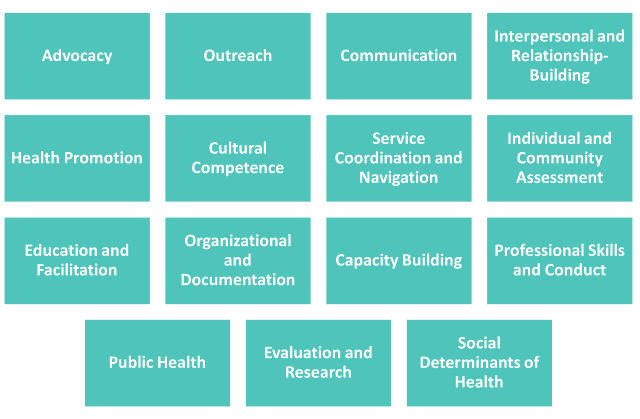Imagine you’re interviewing someone for a job in your new community health worker (CHW) program. They look amazing on paper – they’re great at connecting with people and have helped a lot in their current job. But when you talk to them, you realize they struggle with seeing the bigger picture. They’re focused on just a few parts of the job, but they can’t step back and understand how the whole program fits together to build health in the community. It’s a reminder that being good at one or two tasks isn’t the same as having the right overall skills. And if you ignore that difference, it could cause problems down the road.
That’s why it makes sense to train new—and retrain experienced—CHWs in core competencies. That’s why so many areas around the US now encourage or require CHWs to follow core competencies.
Register Now: Core Competencies for CHWs [Free Session]
Why Train CHWs?
You may be required to train CHWs in your state, but it’s still a good idea anyway. CHWs, and other health promoters like community health representatives, promotores de salud, and peer educators, are the frontline health workers who can make a big difference in the lives of people in your community, so it’s a good investment. Training CHWs in core competencies gives them the tools they need to do their jobs well. You’ll give them what they need to to be effective in their roles, so they can make a real difference in people’s lives.
When CHWs understand core competencies, they can focus on the big picture—a program’s overall goals and strategies.
CHW Core Competencies

So how do you better develop your CHWs knowledge? Train them in the right competencies.
Check with your state to see if there are requirements you should follow first. In general, the following is a summarized list of core competencies to be a CHW that are common in most areas. They are based on the skills identified by the Core Consensus Project.
Each competency includes a list of key skills. Download a copy of this list in the Core Competencies Resources Guide to take with you.
Some states have individual core competencies for their CHW program, and many include professional development courses in health-specific topics such as managing chronic illnesses or maternal and child health topics. Some states offer certification, and some have grandparenting programs for CHWs with similar skills. Also read about the most important job skills to build a CHW career path.
Core Competencies For CHWs
Register now for this foundational course and save with the Early Bird Discount.
Core Competencies for CHWs
Register now for this foundational course and save with the Early Bird Discount.
1. Advocacy Skills
- Connect clients with the right health care
- Involve the community in clients’ issues by promoting causes and using existing resources
- Educate community members, legislators, the media and other professionals or organizations about clients’ issues
- Use social media as an advocacy platform
2. Outreach Skills
- Build and strengthen communities
- Educate community members about programs and services that benefit them using community outreach
- Understand various populations and how to communicate with them
- Understand the needs of different populations
- Learn to build collaborative relationships with colleagues and partners
3. Communication Skills

- Learn about the different ways we communicate, including verbally and non-verbally
- Use active and empathetic communication skills
- Look out for and overcome barriers to communication barriers
- Be a clearer communicator, both when speaking and when writing
- Connect clients to resources in their language, including medical interpreters and translated documents
4. Interpersonal and Relationship-Building Skills
- Provide clients with coaching and social support
- Coach clients in self-management so they can manage or even avoid chronic illness
- Use interviewing techniques, such as motivational interviewing
- Work as a team member
- Manage conflict
- Practice cultural humility
5. Social Determinants of Health and Cultural Competency
- Understand culture’s role in a person’s health, including behaviors, language, customs, beliefs, and perspectives
- Learn culturally appropriate and respectful ways of communicating
- Use empathy to connect with people who come from various backgrounds
- Deliver health care services that meet people’s social, cultural, and linguistic needs to avoid health disparities
- Build relationships with partners and colleagues to deliver culturally and linguistically appropriate services
6. Service Coordination and Navigation Skills
- Coordinate care, including naming barriers and accessing resources to help
- Make referrals and build relationships with clinical and other community services
- Facilitate the development of a person’s or group’s action plan and help them reach that goal
- Follow-up and track care and referral outcomes

7. Individual And Assessment Skills
- Develop a keen understanding of contextual factors when assessing individuals within your community
- Discover formal assessment methods to get actively involved in community initiatives
- Feel confident designing, implementing, and interpreting individual assessments, including home evaluations
- Learn to design, implement, and interpret community-wide assessments and initiatives
- Help teams channel define unique needs within the community
8. Education and Facilitation Skills
- Improve the ability to break complex topics into manageable information
- Collect pertinent health information from and for community members
- Plan and conduct health classes for varied audiences
- Use cultural context to bring accurate, relevant information to community members
- Measure community members’ understanding of health issues to help predict outcomes
9. Evaluation and Research Skills
- Organize schedules, shifts, and reporting on team members and priorities to maintain clear communication with supervisors or the work team
- Plan goals for individuals and the organization, considering such factors as priorities, and budget
- Establish a safe space for coworkers with open, clear communication
- Take charge of event organization, both internal and external (workshops, outreach efforts, educational presentations, and more)
- Oversee project development and ensure that priorities and objectives are being met
10. Community Capacity Building
- Help team and community members explore their capacities
- Empower the community to make conscious choices
- Build connections, support, and allyship within communities
- Help individuals advocate for themselves through empowerment and education
- Lead community initiatives confidently, identify local leaders and support them
11. Professional Skills and Conduct
- Learn to manage time, resources, and priorities individually while balancing stressors
- Assess situations and determine risk factors and potential solutions
- Utilize the available resources to their best potential, including technology, assessment tools, and more
- Adhere to ethical and standards including codes of ethics, laws, bills, and other institutional guidelines
- Assume professional education and self-improvement as pillars for personal development
12. Public Health
- Develop a deep understanding of the public health structure
- Understand the role and responsibilities that fall on CHW’s shoulders as frontline health workers
- Identify challenges and opportunities in communities by addressing the four pillars of public health
- Combine theoretical knowledge and culturally relevant experience to understand public health locally
- Dive into the complex nature and root causes of some of today’s biggest health challenges, and explore how these affect healthcare services and populations
We’ve compiled this Core Competencies Resources Guide to help you find the right program.
CHW Core Competencies
Find out all about what the CHW Core Competencies are, CHW roles, CHW careers, how to cross-train your staff, and how to get state certifications for the CHWs on your team

